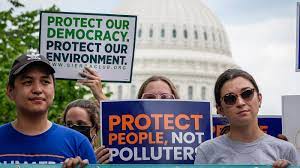From the Opinion Editorial by Donna Chavis, The Hill, 11/23/22
In September, Environmental Protection Agency (EPA) Administrator Michael Regan held a press conference in Warren County, N.C. to announce the creation of a new national office charged with advancing environmental justice and civil rights. That same month, the county commemorated 40 years since its predominantly Black residents marched to a nearby landfill to protest the dumping of toxic waste into their communities. Although their efforts failed at that moment in 1982, this resistance shined a light on how polluters — backed by politicians across the political spectrum — unjustly target low-income communities and communities of color with dirty energy infrastructure that harms people and the planet.
The Biden administration has since taken some notable steps to prioritize environmental justice. But members of Congress — including some self-described “climate champions” — are now threatening to undo this progress and further inflame our country’s legacy of environmental racism by backing Sen. Joe Manchin’s (D-W.Va.) dirty deal masquerading as “permitting reform.”
Manchin garnered strong support for this plan as a side deal to secure his vote for the passage of the Inflation Reduction Act. With strong support from Senate Majority Leader Chuck Schumer (D-N.Y.), President Biden and other Democrats, Manchin worked to pass legislation that, rather than reform permitting, could actually destroy safeguards that for decades have protected vulnerable communities from polluted air, water and land. In September, Manchin’s effort to include his reform in a continuing resolution rightfully imploded. Manchin is now trying to cram his backroom deal into must-pass legislation, such as the next National Defense Authorization Act (NDAA), even though community resistance helped defeat the unpopular first attempt in September.
If Manchin gets his way, this scheme could gut bedrock environmental laws, silence crucial community input during the permitting process and expedite dirty energy projects that our planet simply cannot afford. It could even force completion of the fracked-gas Mountain Valley Pipeline through Manchin’s home state of West Virginia and into parts of Virginia and North Carolina, which courts have previously rejected over improper consideration of the slew of environmental harms from the project. All of the above would make a mockery of Biden’s stated commitment to environmental justice and civil rights.
The deal also targets one of our country’s most important bedrock conservation laws: the National Environmental Policy Act (NEPA). For over 40 years, NEPA has required federal agencies to closely analyze a range of environmental and socio-economic impacts before approving projects like power plants, roads and bridges. Crucially, it grants citizens their most meaningful opportunity to provide input about the impacts a new project might have on their community. Manchin’s plan could eviscerate these crucial mandates.
Apparently, Manchin wants you to think that NEPA is the culprit for delayed infrastructure. In reality, NEPA improves our government by ensuring that public officials look before they leap. Reserving adequate time and a formal process to fully consider all impacts of a proposed project and gather stakeholder input is essential to streamlining new infrastructure. In fact, recent peer-reviewed studies have confirmed that project delays are typically caused by alack of opportunities for stakeholder consultation. Manchin claims he wants to expedite infrastructure buildout, but it’s obvious that his plan would make it easier to build fossil fuel projects and take us in the wrong direction.
Let’s be clear: No permitting reform that sacrifices these safeguards can be considered equitable for communities or beneficial for the climate. Manchin, the darling of Big Coal, Oil, & Gas, is not interested in speeding up justly sourced renewable energy projects or moving us toward a healthier future. It’s both disingenuous and ridiculous for any Democrats or proponents of environmental justice to pretend otherwise. Although work to reform clean energy transmission may be needed, it should not and will not be led by Manchin, and it cannot come through a rushed process that throws low-income and communities of color under the bus.
Any elected official who greenlights this brazen fossil fuel wish list while paying lip service to environmental justice cannot call themselves a “climate champion.” True environmental stewards don’t seek to eliminate the public’s main access point in the federal permitting process. Public participation is foundational to our democracy and communities should have a say over the dirty energy projects they could be forced to live with. The only ones who benefit from this side deal are the polluters who profit off the worsening climate emergency and their enablers in Congress who can rake in more fossil fuel campaign donations.
Elected officials must act right now to kill this dirty deal for good. Further silencing the voices most impacted by the climate crisis would erase the Biden administration’s positive steps forward on environmental justice, such as the EPA’s new environmental justice office and the Justice40 Initiative. Lawmakers should instead follow the lead of environmental, climate and frontline leaders and support legislation like the Environmental Justice for All Act, which would address the disproportionate health and environmental harms that federal actions have on those most vulnerable to climate catastrophe.
Every person has the right to breathe clean air, drink clean water and live on uncontaminated land. Our lawmakers must do what is morally right for people and the planet and reject Manchin’s ill-fated ploy.
>>> Donna Chavis currently serves as Climate & Energy Justice Program manager with Friends of the Earth U.S. and a recognized leader in social and environmental justice change and practice. She was a member of the Planning Committee of the First National People of Color Leadership Summit in 1991, which developed the Principles of Environmental Justice. She is also a member of the Lumbee tribe of North Carolina.

